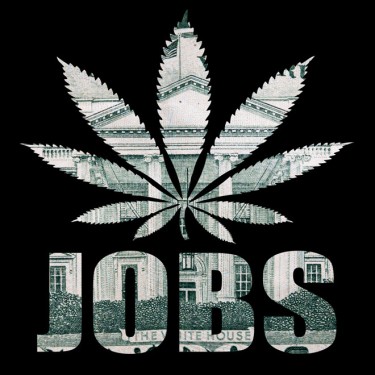
The Legal Cannabis Industry Employs 440,000 People Full-Time
If you’ve been thinking about shifting careers to the legal cannabis industry, consider this a sign.
Working in the United States cannabis industry has proven to be lucrative, with a growing list of opportunities to advance your career. And there’s no need to worry even if cannabis is still illegal in the eyes of federal law; employees of the cannabis industry can still avail of excellent job benefits and be protected from harassment and discrimination. Of course, this depends on the type of company you’re working at.
As more states legalize marijuana, the opportunities continue to rapidly expand. A new report by Vangst and Whitney Economics has also just shown that 23,000 new jobs were added by the legal cannabis industry last year alone. This means that the industry has seen a 5.4% increase in jobs year-on-year.
As of 2024, the research found that there are now 440,445 full-time employees in the legal cannabis industry. According to Vangst and Whitney, it’s a “sign that the business climate has begun to stabilize somewhat nationally after the turmoil of the past two years.”
“Nationwide, annual cannabis sales increased to $28.8 billion in 2023, a 10.3% rise over 2022’s sales. That figure includes all state-regulated medical and adult-use sales, but does not include hemp-derived products or cannabis jobs in the illicit market. That’s good news for an industry that has endured strong headwinds,” reads the report.
The report also made notable mention of positive trends in the industry, most particularly when it came to sales increases and job creation. They do note, however, that the 5.4% increase wasn’t evenly distributed because successful cannabis markets differ in geography and region. They specifically mention that Michigan and Missouri were the top markets in job creation, generating over 10,000 new jobs in each state last year.
New York and New Jersey were close contenders, and, ironically, the most mature markets of California, Colorado, Washington and Oregon saw the most dramatic job losses. “Stretching back to 2014, when the first legal-use stores opened in Colorado and Washington, the industry had enjoyed job growth of 15% to 41% year-over-year. For nearly a decade, cannabis was America’s fastest growing industry,” reads the report. Unfortunately, the pandemic pulled a trigger on the industry, especially when combined with other factors that gave it a big hit: inflation, rising interest, reducing wholesale costs, and changes among consumer buying patterns.
It's also interesting to note that they predict Ohio, New Jersey, New York and Maryland’s cannabis markets to see the most growth this year.
What Kind Of Jobs Can You Get In The Cannabis Industry?
Before the last decade, working in cannabis was associated with an illegal grower or someone who’s sold weed on the streets.
How things have changed, thanks to legalization: these days, the legal cannabis industry is worth billions of dollars, and requires the skills and expertise of a wide range of professionals for businesses to succeed. Of course, you have to be aware of the rules and laws in states before applying for a job. It helps to pay attention to the job market because of its fast-growing nature.
In states that have legalized marijuana either for medical or recreational use, these are some of the most common types of roles needed to fill. However, remember that cannabis businesses will do a strict background check for all employees, who need to be at least 21 years of age to apply:
-
Customer service
-
Budtender
-
Grower/marijuana cultivator/cannabis processor
-
Director of Extraction or Cultivation
-
Extraction technicians
-
Dispensary managers
-
Marijuana delivery drivers
-
Director of operations
-
Cannabis consultant
-
Laboratory technicians
-
Sales and marketing professionals
-
Edibles chef
The salary ranges as well as job growth opportunities for roles do vary; a new startup, for example, may offer smaller wages compared to roles at established businesses. Aside from these jobs mentioned, there are also secondary jobs in cannabis that don’t require specialized knowledge on the plant – all industries require these types of workers, cannabis included:
-
Security/law enforcement
-
Software developers
-
Social media managers
-
Writers/content creators
-
Sales representatives
-
Marketing managers
-
Brand managers
-
Accountants
Last year, Weedar, a platform specializing in loyalty and distribution for the cannabis industry, shared insights on the best-paying jobs in the industry. They came up with their findings using vacancies on the job posting platform, LinkedIn, searching for white collar jobs whose salaries were as much as $115,000.
They found that the most lucrative jobs were:
-
Cannabis sales managers
-
Cannabis marketing manager
-
Cannabis business operations manager
-
Cannabis consultant
“Cannabis can offer pretty reliable jobs for the markets in the United States, for a few reasons: First reason is that it’s an essential business,” explains Jonathan Bohun, WEEDAR founder and CEO. “It doesn’t matter if things are getting worse or better in the country. You still need to relax. People still need their medicine,” he said, in an interview with Forbes.com.
“The second reason sit hat the cannabis industry nationwide is pretty young,” he adds. “And it’s still growing – so whoever found a job in the cannabis market now can be certain it’s only going to go up. So year, I would say cannabis jobs are pretty stable, and more and more companies have a venture capital background, with lots of funding entering the market,” he said.
Conclusion
According to BDSA, a premier cannabis market research firm, the US cannabis market is seen to balloon to $46 billion in worth by 2028. States driving growth are seen to be Connecticut, New York, New Jersey, Maryland, and Illinois. Given this data, we can assume with confidence that employment will continue to grow as well. If you’ve been wanting to explore an opportunity in the cannabis space, the best time is now!
MARIJUANA JOBS IN AMERICA, READ ON...
HOW MANY PEOPLE WORK IN THE ILLEGAL WEED INDUSTRY IN AMERICA?






